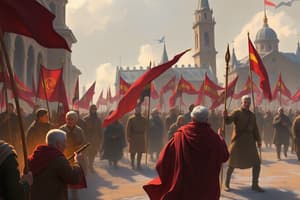Podcast
Questions and Answers
Which European country saw the emergence of a unified national identity under Chancellor Otto von Bismarck?
Which European country saw the emergence of a unified national identity under Chancellor Otto von Bismarck?
- Italy
- France
- United Kingdom
- Germany (correct)
What impact did nationalism have on regional identities in France post the French Revolution?
What impact did nationalism have on regional identities in France post the French Revolution?
- France became a completely homogenous society
- Regional identities strengthened and became more prominent
- Regional identities were completely eradicated
- Regional identities persisted in some areas like Brittany and Provence (correct)
Where did the birthplace of modern nationalism originate according to the text?
Where did the birthplace of modern nationalism originate according to the text?
- France
- Italy
- Germany
- United Kingdom (correct)
Which European country's national identity emerged during World War I due to a sense of shared sacrifice?
Which European country's national identity emerged during World War I due to a sense of shared sacrifice?
What was a notable effect of Italian nationalism in the 19th century?
What was a notable effect of Italian nationalism in the 19th century?
Which European country's unity due to nationalism faced internal conflicts that challenged its coherence?
Which European country's unity due to nationalism faced internal conflicts that challenged its coherence?
What historical event led to the development of Spanish nationalism after the death of Ferdinand III in 1369?
What historical event led to the development of Spanish nationalism after the death of Ferdinand III in 1369?
How did Polish nationalists respond after losing independence in the late 18th century?
How did Polish nationalists respond after losing independence in the late 18th century?
What effect does nationalism have on fostering pride in cultural heritage and driving collective action?
What effect does nationalism have on fostering pride in cultural heritage and driving collective action?
What are some challenges to traditional forms of nationalism in contemporary Europe?
What are some challenges to traditional forms of nationalism in contemporary Europe?
What factor contributes to the rise of nationalism based on civic values rather than ethnicity?
What factor contributes to the rise of nationalism based on civic values rather than ethnicity?
How has nationalism shaped Europe's history in terms of states, borders, and alliances?
How has nationalism shaped Europe's history in terms of states, borders, and alliances?
Flashcards are hidden until you start studying
Study Notes
Nationalism in Europe
Nationalism is a political ideology that emphasizes the importance of preserving and promoting the unique culture, identity, and interests of a particular nation, ethnic group, or people. In Europe, nationalism has been a prominent force throughout its history, shaping the continent's political landscape and driving the course of events from the 19th century through to the present day.
Nationalism Movements in Different European Countries
United Kingdom
The birthplace of modern nationalism was Scotland, where the English crown came into conflict with the Scottish one. The idea of Britishness only truly emerged during World War I when a sense of shared sacrifice created a stronger bond between people across England, Wales, and Scotland.
France
In France, nationalism played a significant role after the French Revolution in creating a centralized state while suppressing regional languages and cultures. Despite this, regional identities persisted in certain areas like Brittany and Provence.
Germany
German nationalism traces back to the time when Germanic tribes first emerged in Central Europe. During the late 19th century, a unified German national identity was formed under Chancellor Otto von Bismarck. However, this unity did not last long due to internal conflicts within the country.
Italy
Italian nationalism began in the 19th century when various city-states were united into a single nation-state under King Victor Emmanuel II. Fascist dictator Benito Mussolini further bolstered Italian nationalism until his regime fell in 1943.
Poland
Polish nationalism can be traced back to the Middle Ages when it was a part of the Holy Roman Empire. After losing its independence in the Partitions of Poland in the late 18th century, Polish nationalists fought to regain their sovereignty. This struggle culminated in the creation of a revived Polish state in 1918.
Spain
Spanish nationalism developed after the death of Ferdinand III in 1369, which marked the end of the Reconquista and the beginning of the war among the Christian kingdoms for dominance over Castile and Aragon. Later, Francisco Franco used Spanish nationalist sentiment to maintain control during the Spanish Civil War.
Effects of Nationalism
Nationalism has had both positive and negative impacts on Europe and its peoples. On the upside, it fosters pride in one's own cultural heritage and can drive collective action towards common goals. However, it also creates divisions along national lines, leading to potentially violent conflicts.
Role of Nationalism in Shaping Europe's History
Overall, nationalism has shaped much of Europe's history by influencing the formation of states, borders, alliances, and even wars. It has often led to increased tensions between nations or groups, sometimes resulting in violence.
Challenges to Nationalism in Europe
In contemporary Europe, there are several challenges to traditional forms of nationalism. These include the rise of trans-European identity, the decline of traditional national symbols, and the emergence of new forms of nationalism based on civic values rather than ethnicity.
Causes of Nationalism
Nationalism arises from various causes, including historical memories, feelings of discrimination based on race, religion, or ethnicity, economic pressures related to globalization, and the desire to protect one's culture and traditions.
In conclusion, nationalism has been a powerful force in shaping Europe's history, driving the course of events from the 19th century to the present day. While it has had some positive effects, such as fostering pride in one's cultural heritage and driving collective action, it has also caused division and potential conflict. Today, nationalism continues to evolve in response to changing social dynamics and geopolitical realignments.
Studying That Suits You
Use AI to generate personalized quizzes and flashcards to suit your learning preferences.




